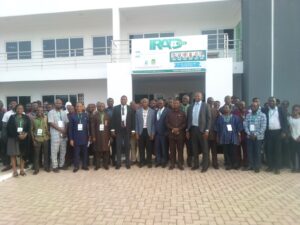By Samuel SAM
A World Bank Group’s Country Climate and Development Report (CCDR) for Ghana estimates that at least one million people could fall into poverty due to climate shocks, if urgent climate actions are not taken.
It warned that incomes could reduce by up to 40 percent for poor households by 2050, if the country fails to embrace development pathways that build resilience to climate change and fosters a transition to low-carbon growth urgently as well as through a combination of policies and public and private investments.
Against this backdrop, the Minister of Environment, Science, Technology and Innovation, Dr. Kwaku Afriyie, in a speech read on his behalf at the fourth edition of the International IRAD conference held at the West African Centre For Water, Irrigation And Sustainable Agriculture (WACWISA) of the University for Development Studies (UDS) – Nyankpala Campus, Northern Region, emphasised the crucial need to expedite action to curb a looming poverty crisis.
According to the minister, an accelerated collective effort toward achieving carbon neutrality, promoting renewable energy sources, and implementing nature-based solutions is needed.

He stated that by harnessing the power of science, technology and innovation to promote health and safety, “we can develop sustainable practices and resilient infrastructure that safeguard our planet for future generations”.
The two-day event, organised by WACWISA, in collaboration with UDS and support from Ecobank Ghana, Yara Ghana, Savannah Communication , ADB, labmart and GCB Bank, was dubbed ‘Climate Change, Water, Food Systems and One Health: The Need for Sustainable Solutions’.
It aims at creating a platform for deepening established relationships and sharing scientific ideas and innovations emanating from research works of scientists across Africa and the globe.
It also sought to advocate the importance of climate to humanity and the urgent need to fashion out sustainable interventions to the changing climate.
Northern Regional Minister, Alhaji Shani Alhassan Shaibu, in a speech read on his behalf, commended WACWISA and UDS for championing climate issues in the region and Ghana as a whole.
He called for collective action from all stakeholders to reach workable solutions to effectively address climate issues.
For his part, the Vice Chancellor of UDS, Prof. Seidu Al-Hassan, noted that his outfit was committed to providing quality education. The university, he noted, is positioned to deliver world-class education in a bid to find lasting solutions to the varied socio-economic problems facing Ghana and the world.
Director of WACWISA Prof. Felix Kofi Abagale, on his part, said more than 100 scientific abstracts for IRAD 2024 were received from authors with affiliations from 14 countries, out of which 73 were accepted after a review, with best three honoured.
He said research works at WACWISA by scientists and students have culminated in innovations which are supporting economic growth at the rural level.
In particular, he said some of the innovations are helping to improve shea kernel processing, which has resulted in over 40 percent increase in shea butter yield and up to 30 percent increase in stearic, palmitic and linoleic free fatty concentration.










